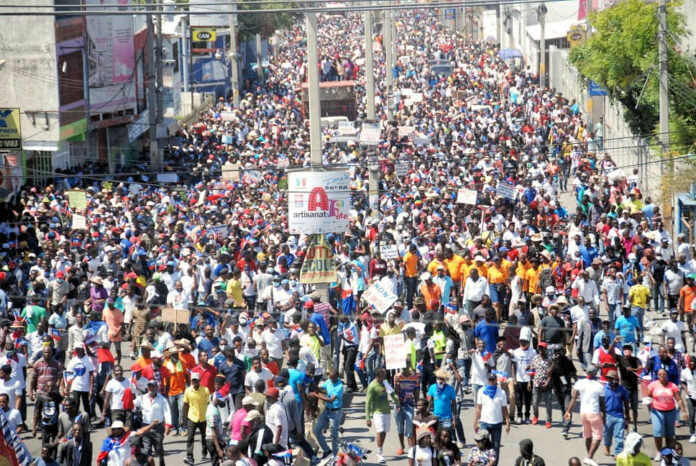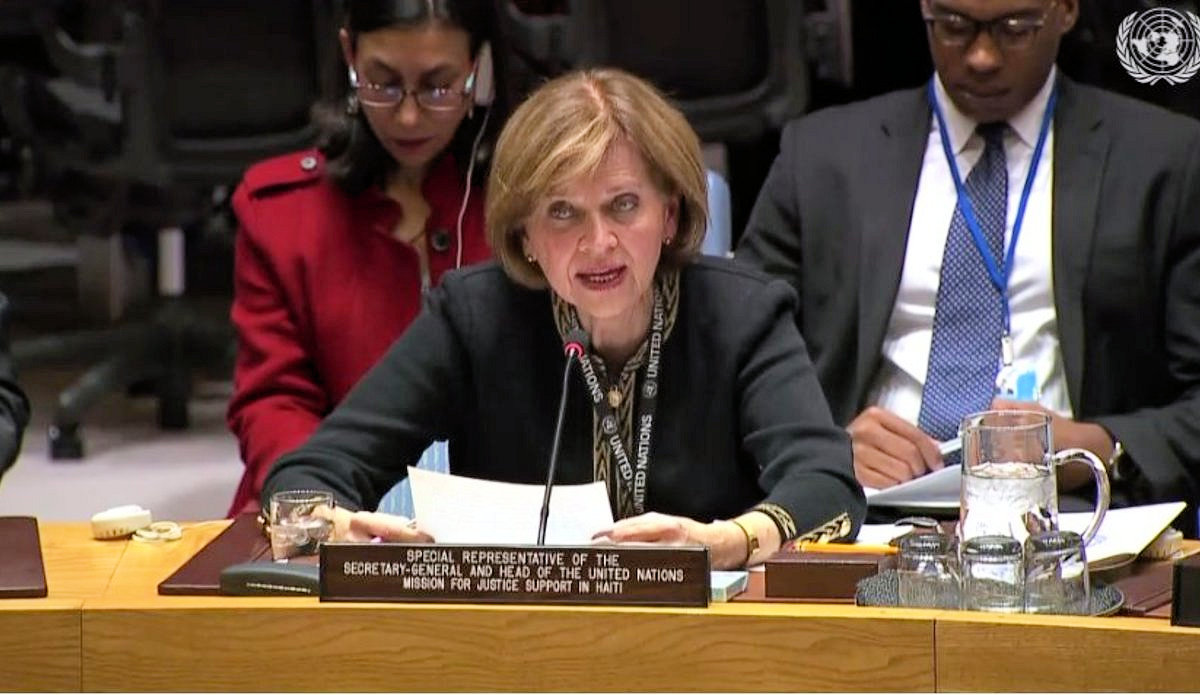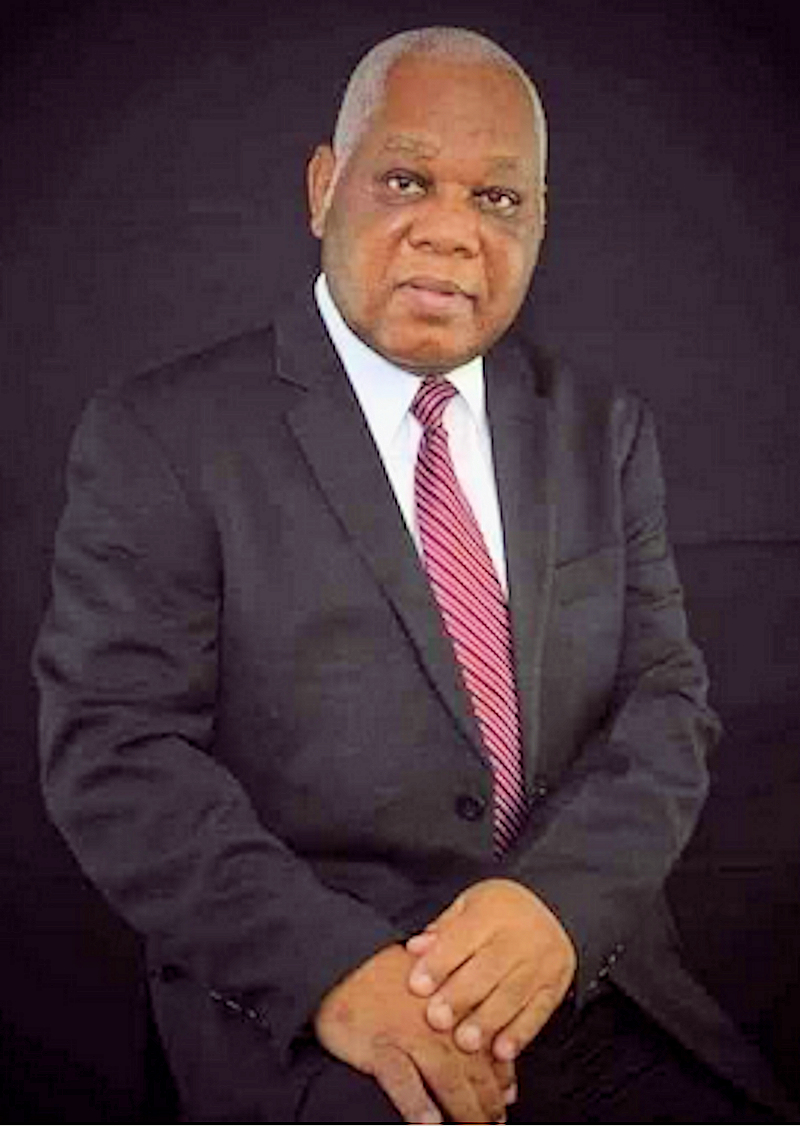
Feb. 7, 2021 marked the constitutional end of Jovenel Moïse’s presidential mandate. His regime had survived until that date thanks to the support of the so-called “international community,” whose influence is derived from the U.S. government’s imperial “big stick.” Is this support unconditional? We wonder since we do not know the basis of the empire’s racism-soaked blindness, which has finally become indecent, in favor of a regime which will do anything to protect itself. In any case, this stubbornness can in no way prevail against Article 134.2 of Haiti’s Constitution of Mar. 29, 1987, amended on May 9, 2011 reads as follows: “The presidential election takes place on the last Sunday in November of the fifth year of the presidential term. The president takes office on Feb. 7 following the date of his election. In the event that the ballot cannot take place before Feb. 7, the president takes office immediately after the validation of the ballot and his mandate is deemed to have started on Feb. 7 of the year of the election.”
Who are the most competent authorities to interpret our laws?
The amended Constitution had the same term conditions concerning the Deputies (see Articles 92 and 92.1) and the Senators (see Article 95). These are the articles that ex-president Jovenel Moïse referred to on Jan. 13, 2020 to end the mandates of all deputies and all but a third of the Senate. The mayors suffered the same fate. They have been replaced by “Interim Executive Agents.” Most of these elected officials, who fell within the scope of the aforementioned article, did not complete the full arithmetic time of their mandate. President Jovenel had no idea that he remained in harmony with the constitutional time of these representatives. However, he has awarded himself the right to rise above the Constitution and all other laws of the Republic because he does not feel he is affected by this same article. He seeks to benefit from his own inept calculation for not having organized the legislative elections and those of the territorial collectivities according to the constitutional schedule. Thus, the country has at its head, for over a year, only 11 elected officials, including former President Jovenel Moïse himself and the ten remaining senators. In the meantime, he has issued more than 40 decrees, some more incredible and illegal than others. There is even one that goes beyond any principle of international law, allowing anyone who has been sentenced to a felony but pardoned by the Head of State to run for office. It is clear that, by this decree, he protects himself by protecting his peers.

It is not an objection invented by the political opposition’s different tendencies nor by the population’s majority which is behind their demand for him to withdraw from the National Palace. It is because of this constitutional prescription which inspired the 2015 electoral law, which the vast majority of Haitians are demanding be applied. Influential religious institutions, such as the Catholic Church, the Protestant churches, and the vodou sector, and the trade union federations (except the yellow ones) have recognized the end of Jovenel’s mandate and demanded respect of the Constitution. The same position has been taken by the opposition’s main political parties and organizations, and the most recognized human rights organizations.
However, we must give special consideration to two authorities which have weighed in on the matter: Haiti’s Bar Federation and the Superior Council of the Judicial Power (CSPJ), the latter, for its part, being co-depositary of national sovereignty. They reached the same conclusion as the sectors mentioned above: the end of Jovenel Moïse’s mandate was on February 7, 2021.
What about U.S. Ambassador to Haiti Michele Sison and Helen La Lime, head of the United Nations Integrated Office in Haiti (BINUH), as well as the Organization of American states (OAS), European powers, and Canada, which are all supporting Jovenel Moïse as he overstays his mandate and issues illegal decrees. Do they have more legitimacy or authority than the Haitian Bar Federation or the CSPJ? Certainly not.
The Western powers gave a green light to Ms. La Lime, among many others, to brazenly lie to the world about the political reality and setbacks of Jovenel Moïse and his Haitian Bald Headed Party (PHTK). In addition, these powers are assured of the loyalty of Haiti’s ruling classes, just as when Washington occupied Haiti in July 1915.
It seems that the racist theories of the 19th century French aristocrat Arthur de Gobineau are still alive. Needless to say, there is no such thing as a white, yellow, or black race, putting the white race at the top of the scale and the black race at the bottom. There is only one race: the human race. With the advance of science, Hannibal Price would not have pleaded, in his book published for the first time in 1898, for “the rehabilitation of the black race by the Republic of Haiti” but “for that of human beings” . Anténor Firmin would have today written in his work “on the equality of the human race,” published in 1885, which is a true manifesto, instead of “human races.” Tout moun egal ego. (Everyone is equal.) Africa and its children have demonstrated this scientific truth in all fields without exception, despite all the obstacles that continue to be put in their way.
Unfortunately, too many sectors of the opposition have taken U.S. President Joe Biden’s baited hook and forgotten that it was the Clintons, two influential Democrats, who gave us President Michel Martelly in 2011. Why has Biden, the empire’s new president, from the first days of his inauguration, targeted as a dictator Venezuelan President Nicolas Maduro, who was elected by one of the world’s most reliable electoral systems, according to former U.S. President Jimmy Carter? Why hasn’t he attacked certain policies of his equally reactionary Republican predecessor (with some nuances, of course), such as the Saudi Arabia dossier, which brings in billions of dollars in sales to the U.S. arms industry, while has he neglected the situation in Haiti?
What is the real motive of these interventionists?
Thanks to the support of the colonizing countries which trampled the dignity of first nation peoples, Jovenel Moïse remains clinging to the power which he will have to let go of due to the popular mobilization’s continued growth. The new dictator finds himself engulfed in an irreversible cycle of repression and illegal measures. With the help of his de facto Prime Minister and de facto Justice Minister, Jovenel fomented a self-coup to be able to justify the irregular and arbitrary arrest of 23 people, including a Supreme Court justice, for involvement in this poorly-tailored hoax. He eventually released the justice from jail, but then illegally removed him and two other justices from the Supreme Court simply because their names were on the list of justices to approach for presiding over a transitional government. At the same time, he trampled on the established process for replacing them. Our laws say that Haiti’s President only appoints Supreme Court justices from a list of three persons per seat submitted by the Senate and approved by the CSPJ.
too many sectors of the opposition have taken U.S. President Joe Biden’s baited hook and forgotten that it was the Clintons, two influential Democrats, who gave us President Michel Martelly in 2011.
Any return to normality of republican rules and principles will require the departure of Jovenel Moïse from power that he illegally seized on Sun., Feb. 7, 2021. Since that date, he has been a de facto president, therefore illegal and illegitimate, isolated on the national scene and more and more internationally. He seeks to maintain power through repression carried out by the National Police of Haiti (PNH), whose director general was appointed without Senate approval, as the Constitution requires. He unilaterally plans to organize elections with a Provisional Electoral Council which the Supreme Court has refused to swear in (because of the illegal way its members were chosen) and the Superior Court of Accounts and Administrative Disputes (CSCCA) has refused to approve its expenses. The de facto president is also seeking to organize a referendum to adjust the Constitution to his tastes.
Jovenel has increased his repressive forces with an unconstitutionally assembled so-called military corps that he calls the Protected Areas Security Brigade (BSAP). The force has already revealed its true nature through its brutal actions against the demonstrators who swear to continue the fight until Jovenel Moïse steps down.
The ex-president’s name is mentioned several times in an audit of the PetroCaribe Fund published by the CSCCA. If Jovenel is also afraid of being dragged before the Courts for the millions he embezzled from the PetroCaribe Fund prior to his election thanks to his mentor Michel Martelly, his foreign and local consorts are aiming to maintain the status quo so as to shamelessly extract and exploit the wealth that is plentiful in our subsoil, according to some experts and multinationals, and condemn our working masses to virtual cheap-labor slavery.
What will be the outcome of this crisis?
Since Jul. 6, 7 and 8, 2018, Haiti has experienced lean times and fierce struggles against the anti-popular policies of Jovenel Moïse. At one point in 2019, all activities were paralyzed, a time called peyi lòk (a nation locked down), to such an extent that the president was only kept in power by a thin thread of support from his foreign friends. If the first mobilizations were against a dizzying increase in gasoline prices in July 2018, the demand changed as demonstrations intensified. Huge crowds in the ten national departments demanded the early resignation of Jovenel Moïse after the publication of the CSCCA report on the squandering of the Petrocaribe Fund.

Since Feb. 7, 2021, with the end of his constitutional mandate, the struggle has reached another phase, that of his legal departure, in accordance with the Constitution’s Article 134.2. An agreement seems to be found within the broad political opposition, even if the consensus is fragile. On Feb. 8, 2021, the opposition appointed Joseph Mécène Jean-Louis, the oldest Supreme Court justice, as provisional president to fill the presidential void. He has had to go into hiding because the de facto Justice Minister threatened to arrest him.
Jovenel, who strutted in a February’s Carnaval celebration, which cost millions of gourds from the public treasury in this time of COVID-19, showed his usual contempt for the majority of the people who are sinking more and more into the filth and employees of various State agencies who demand their unpaid salary. He was largely mistaken in thinking he would regain the popularity he never had with plunging into crowds who love Carnaval. On the contrary, he lost a lot of the 500,000 votes out of about 6 million eligible voters who put him in power thanks to false promises that he has continued to multiply to this day.
The future is in our hands
Only the stepping-up and continuity of the struggle will allow us to succeed in protecting Haiti’s still weak democratic gains, which are now in great danger. The nation awaits a transition which, in addition to preparing for fair sovereign elections, will lay solid stones against corruption and social inequalities. Everything is playing out dialectically on two fronts: that of popular mobilization and that of full respect for republican institutions. The demonstrations of Feb. 14 and 28, in which thousands and thousands of people took to the streets of Port-au-Prince despite intimidation from retrograde forces in the pay of the PHTK clan, are likely a prelude of even greater marches to come. International solidarity based on respect for the dignity and self-determination of the Haitian people should only come in support of the popular democratic will. U.S. imperialism and its dependents in the “Core Group,” which includes Canada, Brazil, France, Spain and the European Union, have only tried to put a brake on that popular will.
The time has come for the progressive and revolutionary left to seize this period of turmoil in order to offer the popular masses, in an autonomous way, the only valid alternative. The imminent departure of the usurper president, in the face of mobilizations which are intensifying and bringing out more and more people, will not be the end of the tunnel. Only socialism can help the country to recover its sovereignty and to reconcile the State with the Nation.
Translated and abridged from the original French version. Marc-Arthur Fils-Aimé is the Secretary General of Haiti’s Rasin Kan Pèp la Party.










